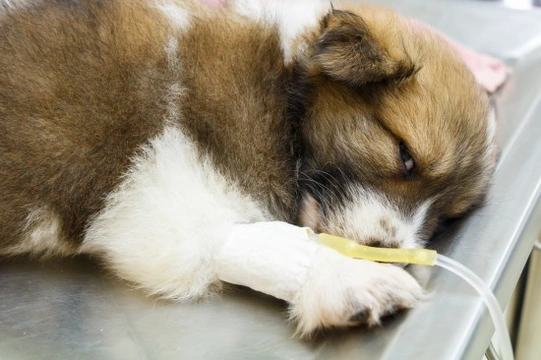
Canine Coronavirus (CCV) - Coronavirus in Dogs
Canine coronavirus (or CCV for short) is an intestinal disease that is canine-specific, and affects all sorts of dogs all over the world. It is an intestinal disease that replicates within the top two thirds of the intestinal tract of affected dogs, and the lymph nodes associated with that part of the intestine.
In otherwise healthy dogs, canine coronavirus is often relatively mild, and often shows only mild symptoms, or even none at all. However, in young puppies, older dogs and dogs with a compromised immune system, it can be serious and even potentially fatal.
Canine coronavirus can also occur as an accompanying infection to other conditions including canine parvovirus and various other intestinal infections, which amplify the seriousness of the condition in all dogs.
All dog owners should be aware of the signs and symptoms of canine coronavirus and how it is contracted, and in this article, we will cover the basics of the condition.
What causes coronavirus in dogs?
As the name suggests, canine coronavirus is a viral condition, which is most commonly spread by contact with an infected dog, or the faeces from an infected dog. Even if a dog is healthy and showing no signs of coronavirus, or has had a attack but fully recovered, the virus itself can remain dormant within the body and be shed in the faeces for up to six months after infection, ready to infect other dogs.
Situations that place dogs into close quarters with other dogs present the highest risk factors for passing on the condition, such as at dog shows, boarding kennels, and heavily trafficked dog parks. Stress and unhealthy living conditions can also contribute greatly to any given dog contracting the condition where the virus is present.
Symptoms of canine coronavirus
Canine coronavirus may vary in its severity from dog to dog, and so, the symptoms of the condition will vary from case to case too. Some dogs with a mild infection may show few or no clinical signs at all, but puppies and dogs with a compromised immune system are apt to become quite sick with the condition.
Some of the symptoms of canine coronavirus include:
- Loss of appetite and general depression and lethargy
- Vomiting, often accompanied by diarrhoea
- Explosive diarrhoea for several days
- Fever and high temperature
- Dehydration
- Respiratory problems in severe cases
Diagnosing the condition
Canine coronavirus shares symptoms with a range of other intestinal infections and conditions, including general food intolerances and allergies, bacterial infections, other viral infections and several others.
Because coronavirus can easily be confuses with other illnesses, in order to get a definitive diagnosis, your vet may decide to run some tests to confirm the presence of the virus. Usually, urinalysis and running some blood panel tests are sufficient to confirm or deny a diagnosis of coronavirus, but in some cases, serology tests and antibody testing may be required as well.
Treatment
What is involved in treating the condition will largely depend on how seriously any given dog is affected by coronavirus, and the highest-risk patients tend to be puppies. Because puppies have not fully developed their immune system when they are young, they are particularly at risk for transmission of the condition, and will tend to be affected by it most seriously.
Puppies and other dogs that are very sick with the condition will generally be treated on an inpatient basis, which may involve IV fluid therapy, antiviral treatment, antibiotics to treat any secondary infections, and careful monitoring and nursing care.
For older dogs that are otherwise healthy, they will often recover from coronavirus on their own, although if the infection goes on for a protracted period of time, they may need supplementary treatment.
One of the most important elements of treating and managing canine coronavirus is keeping affected dogs well away from others, and particularly, keeping other dogs from coming into contact with the faeces of affected dogs. Coronavirus is highly infectious between dogs, and viral strands shed in the faeces of even recovered dogs will remain capable of affecting other dogs that come into contact with them for several months.
Vaccination
A vaccination is available to protect dogs against canine coronavirus, but it is considered to be a non-core vaccine, and is not one of the preventative vaccines that are administered to dogs as standard.
Vaccination is sometimes recommended for show dogs, which often have a slightly weaker immune system than other dogs and also, come into contact with many other dogs in the show ring. However, any dog owner can request coronavirus vaccination from their vet, and you should discuss with your vet whether or not your dog might benefit from any non-core additional vaccines, such as for coronavirus. If your dog is prone to contracting minor ills or has a generally compromised immune system, your vet may advise adding coronavirus immunisation to your dog’s annual vaccines.



